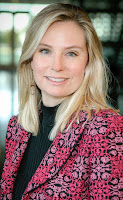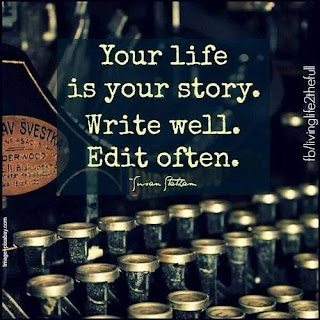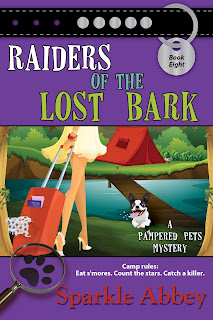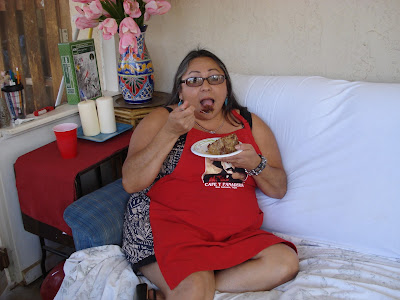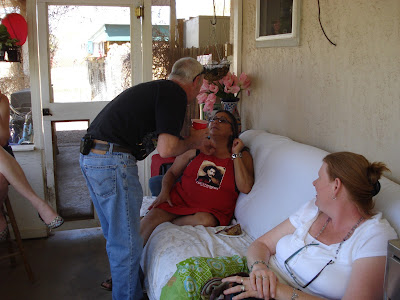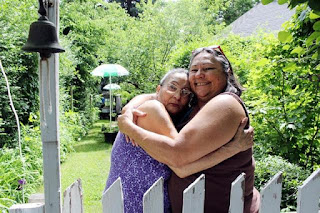My sister, Aimee, and I love the author, Denise Chávez. When I told Aimee I wanted to interview Denise, she told me, “You have to do this! This challenge to interview her and study with her only comes along once in a lifetime, grab it by the chonies and do it!” So I did. The interview with Icon, Denise Chávez , took place on June 24th 2017 in her bookstore, Casa Camino Real in Las Cruces, New Mexico. I will post the interview when I have finished editing the video. Until then let me share with you my experience.
We had just finished an eight hour writing workshop in the hottest day in history, my history. We felt like melted chocolate but carried on in the name of all that is holy. I began by asking the question: Who betrayed you? And followed up with Who did you betray? Her answers were astounding. Be prepared for magic when I post the video interview.
First let me tell you about my mentor, Denise Chávez, literary Chicana author, scholar, performer, teatro artist, and social activist. I met Denise in Pueblo, Colorado when she read from one of her books to a crowd at the Rawlings Public Library. But before she read she walked about meeting the audience of bookworms, writers, students, fans, and when she approached me I felt in the presence of someone magical. I don’t know how else to explain the whirlwind that is Denise. She’s gorgeous with long curly hair she wears in a braid that hangs near her thighs. Her eyes are charcoaled with eyeliner and her eyebrows are magnificent, her lipstick apple red, or maybe cherry. She looked to me like a sage and so I treated her with the respect due an elder, in reality she is a few years older than me but wears her wisdom like a goddess. You know the type. The woman who walks in the room and all eyes are on her. Yeah.
I stood at my table assembling my poetry books, Red Canyon Falling on Churches, and Crazy Chicana in Catholic City for an opportunity to sell a few copies, sign a few for friends, and promote my publisher, Caleb Seeling, Conundrum Press. I covered my table with a white lace tablecloth and stacked books and placed my decorative pieces in a feng shui kind of order. Denise took charge and rearranged it for me and told me how I could improve my visual appeal in the future by using boxes covered to give different levels of height and make the most of my small table. She complimented me for my effort, since mine was by far the most beautiful of tables by booksellers, she chastised my friend in the next table for not even having a tablecloth, so I lent him an extra I had that she deemed too busy. “Use the white for purity and place the cornucopia of fresh garden vegetables you picked this morning in the woven wheat colored basket.”
When she finished, she had amazingly recreated an alter of sorts on my table and it looked much better. She drew a crowd to my table because, well, she’s not a soft speaker, she had a commanding, theatrical voice from all of her years on the stage doing Greek tragedies. She impressed me with her body language, her articulate choice of words, her wardrobe, makeup, style, grace, and wisdom. And I thought, hey, I could learn a lot from a woman like Denise. So I gave her a copy of my book and she waltzed away to her stage and audience and began her recitation. She also carries off a tight stand up comedy set. She made her audience laugh.
Afterwards, I knew she was worthy of devotion so I asked to take a photo with her. She generously posed and now I have a picture with me standing next to the icon. She made me laugh. She gave me hope. She challenged me to do better, be better. I learned that day what an icon looks like. She invited me to visit her bookstore in Las Cruces, New Mexico. I took her business card and handed her mine. Networking number one tool for a writer, work with other master writers. I went home feeling like I had been missing out on something my entire life. Why didn’t I know about her, her writing, her books. I had studied Chicana Literature, Ethnic Literature, American Literature. I went home and perused my texts from college and found her in a couple of my anthologies of ethnic writers. There she was along side, Gloria Anzaldua, Sandra Cisneros, Pat Mora, Cherrie Moraga. I read her writing and decided to order more of her books to read. I called my sister, Aimee, in Camino, California and asked if she had read Denise. She had not. I suggested she go to her library and find some of her writing and study it. Aimee and I edit each other’s writing and encourage each other to learn from master writers we discover.
We read her books and then scheduled a phone date to discuss our new found she-roe. We marveled at her skill and humor. Her prose and dialogue were examples of how to write a great story. We had encouraged one another not to write good books but great books worthy of reading. Denise was that example. Aimee an I related to her stories. They were our stories. We shared a history of culture, language, religion, and dysfunction.
After I finished two of her books, Face of an Angel, and Loving Pedro Infante, I called my sister, Aimee, and declared, “I have to visit Denise in Las Cruces and interview her for my blog. I want to pick her brain for wisdom and writing tips. I want to spend time with her and hang out like comadres.” And that is exactly what I set out to do. It took me months of planning and saving and scraping my pennies, but I would not be deterred. I planned to drive to Las Cruces a 1,000 mile round trip on Interstate 25, alone if I had to. I asked a friend to join me for a road trip. We had traveled to California by car a few years ago, had been roommates in the U.K. on a tour of writers and we became best buds. She’s the family I chose.
So we loaded up my 2016 Subaru Forester and hit the highway. The joy I felt traveling to New Mexico made me a silly school girl. I described to my bud, Judy, how much I adored Denise the woman, not just the writer. She does social activism in her community and creates fundraisers for everything from los libros traficantes to the Cat’s Meow, a feline neuter rescue shelter. She generously donates her books and talents to worthy causes.
I enjoyed the writing workshop and the amazing women who attended. We cried and laughed and wrote and ate and drank Denise’s incredible coffee olla. We were instructed to write about a family myth, legend, or story that we wanted to share with the workshop. We made myth boxes and decorated them with photos and memorabilia. I loved every minute of the class. I was absorbing as much knowledge and power from this woman as possible. The ten women in the bookstore bonded over great food, and stories.
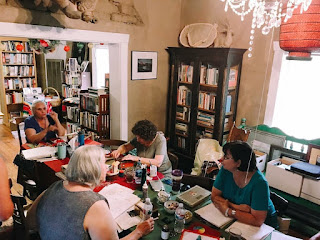
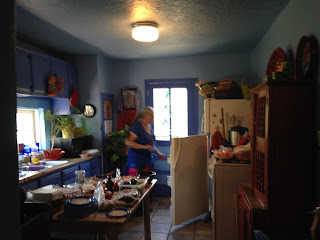
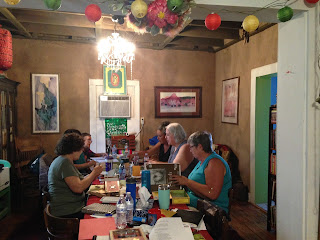
Denise asked us to begin writing our myth or legend and after a few minutes of writing she interrupted us and said, “No. That’s not what really happened. That is bullshit. This is what really happened.” She did this several times and our writing became richer and more robust with each bullshit. She taught us how to write through the bullshit and get to the truth of the story. The truth. What’s the saying? Something like: “If you’re gonna write fiction, it better be the truth.” Simon Ortiz, Sherman Alexie, Shakespeare, someone great said that. And I stole it from Alexie’s Memoir, You Don’t Have to Say You Love Me. I will be writing a review of his new book in the next month or two, stay tuned.
During the workshop, I took photos and toured the bookstore and marveled at the wonderful books, art, photographs, memorabilia, and astounding vinyl collection. Her bookstore is like a museum of ancient and modern history of our creative geniuses. Her bookstore feels sacred. You can feel the ancestors, the spirits, the ghosts hovering above in the adobe casa and even in the antique furniture. The experience changed me in a way I find difficult to describe except to say, I felt reborn, I felt like my life was just beginning and nothing in the past mattered because now I had the secret to my life. I am a writer and I need to write. She told us that many times. We repeated after her, “I am a writer.”
After the workshop, we tidied up the kitchen and put away the food. We chatted like old friends. That is her magic, she makes you feel loved. Loved. Not a fake Hollywood, I love you, man. I real genuine love from a genuine woman who knows the way to heal the world is to heal ourselves. Magic.
I videotaped the interview so I didn’t have to take notes or be distracted. Of course technology has a way of frickin’ fowling things up sometimes. My iPad ran out of memory; but I didn’t. I asked a couple of questions and then decided to turn off the video camera and finish the interview as two women having café olla and talking about myths and legends. The interview lasted thirty minutes but in that short amount of time, she revealed to me her essence. I asked one question, “Who betrayed you?” and in that question she answered several of my other questions that went unasked because she instinctively knew what I was seeking from her. The truth.
I didn’t speak. I listened. I nodded my head and held my tongue. This was my opportunity of a lifetime to interview a Chicana Icon a powerful woman fighting for justice. She supports her community and writers all over the country. She supported me. She encouraged me. She gave me hope.
I can not thank her enough for her generosity. She gave me much more than a writing workshop and interview. She opened up her heart and welcomed me inside to feel her love and strength. She took away my insecurities as a writer and as a woman trying to teach the next generation what is truly important in life. Not money, not fame, but love and peace. We bonded because we gave each other a chance to be honest and look inside ourselves for answers.
We shared a day and later an evening with my bud, Judy, and Denise’s husband, Daniel. We met in the lobby of our motel and talked and laughed until bedtime. I knew I’d like her husband, a photographer, an artist. I had seen his photographs in her bookstore. I knew Denise would be married to someone artistic.
I left Las Cruces high on life. I had set a goal. Accomplished the goal. Made new friends. Learned how to make a myth box. Wrote a legend about my parents love affair in the fifties. I left her bookstore full of excitement to finish my murder mystery, The Colorado Sisters and the Atlanta Butcher. I have confidence and faith in my abilities to tell not a good story, but a great one. Thank you, Denise.

